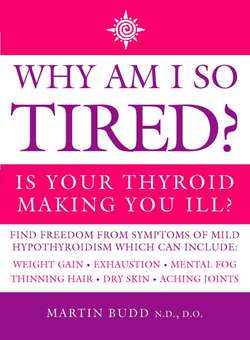Читать книгу Why Am I So Tired?: Is your thyroid making you ill? - Литагент HarperCollins USD, Martin Budd N.D. D.O. - Страница 35
PETER’S STORY
ОглавлениеPeter was an international sales manager for a computer hardware company. His work was very tiring and very stressful. He had targets to set, problems to solve and planes to catch on a daily basis. Aged 50 and at the top of his promotion curve, there were several younger colleagues eager to succeed him. Being unmarried and well paid he tended to rely on restaurant meals, usually taken as working lunches and dinners. In common with many business executives he had settled into a habit of eating rich food with wine and he supported his flagging nervous system with 10-12 sweet coffees and 25-30 cigarettes daily. Not surprisingly he had been overweight for 20 years. However, his weight was not his chief concern. For the previous two years he had suffered stomach pain, heartburn, fullness after meals, fatigue, complete loss of libido, and neck and shoulder stiffness and pain.
A combination of symptoms and work pressures had contributed to his ever-worsening depression. He explained that his chief concern was whether the depression was a cause or a symptom of his ill health.
When I examined Peter he weighed 2101b. His height was six foot with medium-sized hands and feet, so I estimated that he was 351b overweight. His blood pressure was too high at 180 over 95 and he looked and sounded tired and depressed.
Although he did not complain of feeling unduly cold, I requested his morning temperatures. I also requested a full blood screen including haematology (to assess anaemia), a mineral/vitamin profile, and a biochemistry and thyroid profile. Also a heliobactor pylori antibody test to check for stomach ulcers.
He was requested to attend a specialist diagnostic unit in London to have a gastric function test that measured stomach acidity, pancreatic enzyme activity and stomach emptying speed.
Peter had consulted his own doctor and a gastroscopy had been requested. No stomach ulceration was present. He was given a diagnosis of stress gastritis with reflux, and treated with antacids.
The past history had included a bout of glandular fever 10 years earlier, and a brief course of antidepressants three years earlier.
Peter’s test results showed that he had several problems in need of attention. The thyroid hormone T4 was right at the bottom of the range, and his average morning temperature was 97.2°F (36.2°C) The blood lipids were all raised, these included the total cholesterol and the bad LDL fraction, also the triglycerides. His haemoglobin was low, confirming borderline anaemia.
The gastric function test showed a high stomach acid level (low pH) and a pancreatic enzyme deficiency. The stomach emptying speed was normal and fortunately the heliobactor test was negative.
I prescribed a full nutritional programme for Peter which included the following:
* Advice on better eating, a low fat and low sugar diet similar to the food combining pattern.
* Strict avoidance of caffeine, tobacco and alcohol.
* Avoiding business discussions when eating.
* Supplementary iron, multi-vitamins and minerals, thyroid and adrenal glandulars and omega 3 (fish oils) for blood fat control.
* A two phase digestive enzyme formula was recommended.
A substance in cigarette smoke known as thyocyamide can inhibit the thyroid gland. Smoking also destroys vitamin C at the rate of 25mg per cigarette.
Stress can exhaust the adrenals and cause hypoglycaemia with subsequent potassium loss and sodium retention. This process leads to fluid retention, excess weight and raised blood pressure. High cholesterol and triglycerides can cause a narrowing of blood vessels and raised blood pressure.
The exact cause of Peter’s symptoms was unclear. The suspected post-viral fatigue following glandular fever, together with his poor digestion and anaemia, may have depressed his metabolic rate and predisposed him to mild hypothyroidism. He had subsequently developed a vicious circle of fatigue, stress, incorrect eating and more fatigue, coupled with depression. The priority was to improve his vitality to enable him to do his work without undue effort or stress.
Although his neck and shoulder pain was partly caused by his thyroid, Peter was also unfit as a result of lack of exercise. I therefore arranged a course of massage and advised him to make use of the swimming facilities offered at the various hotels that he used.
